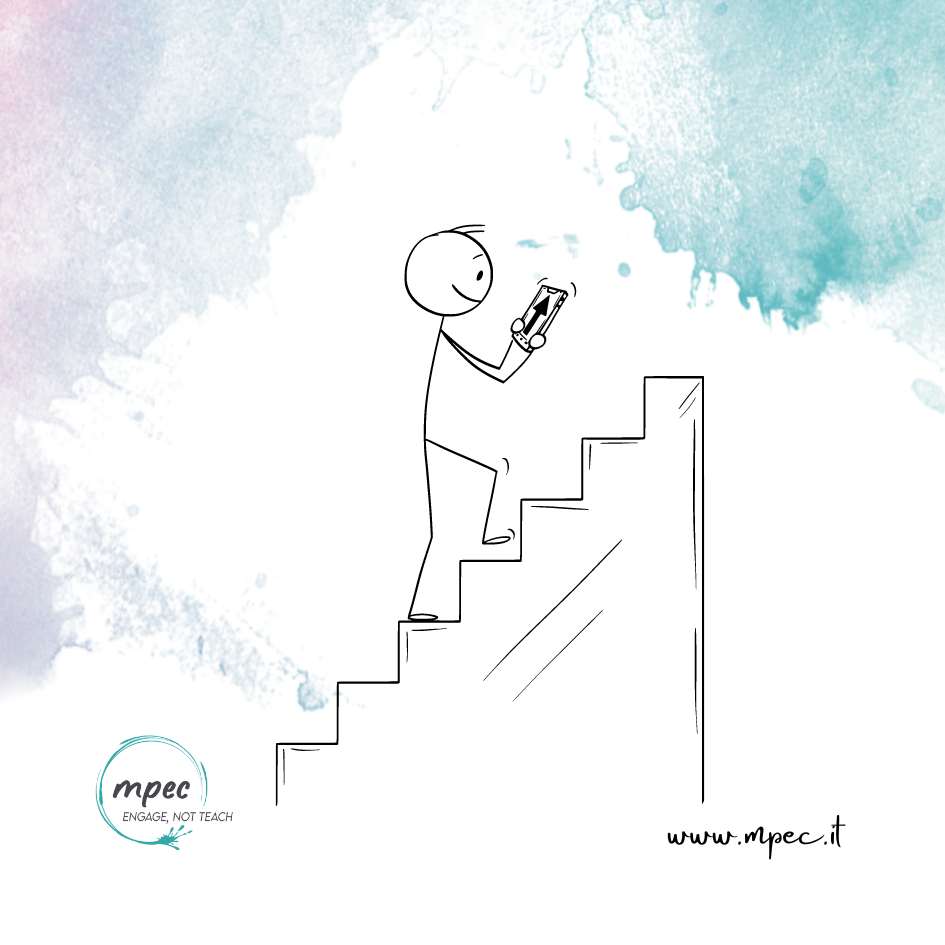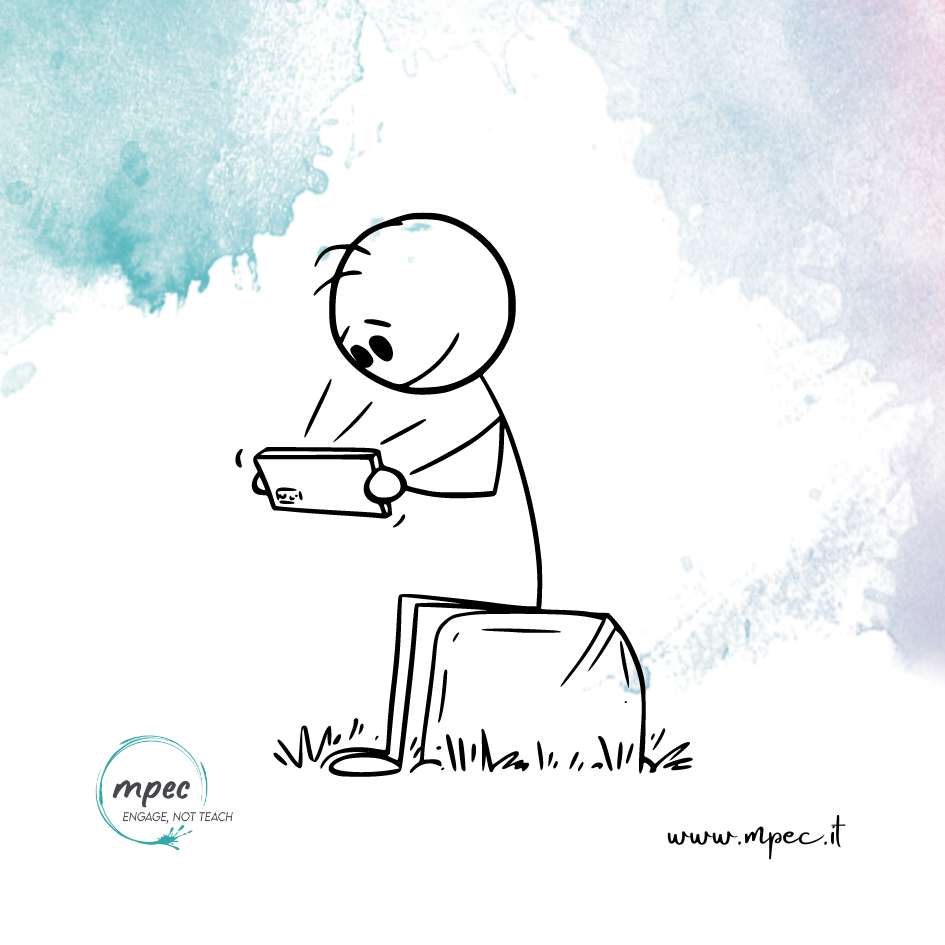Have you ever wondered which app for learning English would be the best for you, or how to add an app to your daily English practice? Or maybe you’ve felt a bit overwhelmed by the variety of apps and websites currently available for those who want to study English? Be it as it may, you’re in the right place. In this article, we analyse how to leverage free apps to make learning English not only more effective but also a lot of fun. From the psychology of habit formation to practical tips on how to make the most of these digital resources, we aim to provide you with a guide to enrich your language learning adventure.
Let’s start with a really important question:
What’s the role of APPs in learning a new language?
It’s quite obvious that apps play an increasingly fundamental role in the teaching of the English language. But why? What makes them so popular?

Apps offer a range of interactive exercises, real-time feedback, and the flexibility to learn at one’s own pace, making language learning more accessible and engaging than ever.
They are strongly oriented towards creating a habit for those studying the language and they do it with the use of gamification: there are challenges, competitions, sounds, and rewards – all to make us feel more involved and to create the dopamine we need to feel the pleasure of learning.
To effectively integrate apps, we must first set personal learning goals. To help you in this step, in our selection of apps that we provide you, for each app we indicate who it would be ideal for.
Once we have chosen the app that suits us, we must incorporate it into our daily practice routines and use it as a self-study tool alongside more traditional learning methods (courses, listening or reading, interaction, etc.) By doing so, apps become not just an aid for language learning but a powerful dopamine boost for our motivation, joy of learning and a great partner to keep us company when we need it.
TOP 7 APPS to learn English
Here are the 7 apps we chose as the best for our students:

Duolingo: Learning can be a lot of fun!
Who is this app ideal for? If you like to play – here’s an app for you. Ideal for those starting to study or at an intermediate level (for more advanced levels, there are better apps). Oh, it’s also a perfect way to make studying more fun thanks to strong gamification.
Main Strengths: User-friendly interface, gamification that keeps attention, the ability to create competitions, and study a wide range of languages.
Main Weaknesses: May not delve into advanced linguistic concepts, repetition can become tedious over time.
What Features Are Available For Free? Access to all basic courses, including vocabulary, grammar, and basic listening exercises.
HelloTalk: Practice with a Native Speaker
Who is this app ideal for? Students looking to practice conversation with a native speaker as a language exchange, even for free.
Main Strengths: Direct communication with native speakers, many free options, opportunities for language exchange, and tools for correcting messages.
Main Weaknesses: The quality of the language exchange can vary depending on the partner, they are not always teachers.
What Features Are Available For Free? Messaging, voice and video calls with limitations, translation tools with limited daily uses.
Memrise: Like Watching Videos To Learn New Expressions?
Who is this app ideal for? It’s for you if you love watching videos of people talking, if you find it easy to memorise things when you hear them used in conversation. It’s very much geared towards those who want to learn real idioms – ideal for advanced students (but you have to take the paid version…)
Main Strengths: Use of mnemonics, video clips of native speakers for real-life context, diversified courses. It also has a very well-made AI Tutor!
Main Weaknesses: Some advanced features require a subscription, it’s not 100% comprehensive for grammar.

What Features Are Available For Free? Basic courses, video contents and repetition-based exercises
Quizlet: Tailor-made Flashcards for ESL Students
Who is this app ideal for? Do you love flashcards? There’s no better app for you. Quizlet is made for those who love having sets of flashcards or who would like to make a personalised study set. It’s intuitive and easy to use – you can study languages or any subject you want, in the language you want.
Main Strengths: Highly customisable, supports images and audio, vast library of existing and free study sets.
Main Weaknesses: Limited interactivity, mainly focuses on memorisation and vocabulary.
What Features Are Available For Free? Almost everything, actually. You have the creation and study of flashcards, access to shared flashcards…
Busuu: Your Partner for a Complete English Course
Who is this app ideal for? It’s perfect for anyone looking for a structured course approach but wants to do it entirely from their mobile phone. It’s a very comprehensive app, but to take full advantage of its completeness, the free version will not be sufficient.
Main Strengths: Comprehensive lessons that cover a range of skills, grammar tips, speaking practice – corrections, AI – everything!
Main Weaknesses: Full access to features requires a premium subscription, limited opportunities for speaking practice.
What Features Are Available For Free? Basic courses, vocabulary and grammar exercises, limited review quizzes.
LINK: BUSUU
Tandem: Digital Era Language Exchange
Who is this app ideal for? Those who prefer immersive learning by conversing directly with native speakers, advanced level students who are not looking for a course but a boost in natural expressions or help with pronunciation.
Main Strengths: Large user community, option to select tutors, personalized language exchange based on personal interests.
Main Weaknesses: Finding the right exchange partner can take time, potential for uneven language exchange.

What Features Are Available For Free? text messages, voice and video, partner search, interaction with the community of users.
Have you found your app? Now, let’s talk about the routine!
Why is a routine so crucial for language acquisition? Simply put, consistency is key. The psychology of habit formation tells us that when we repeat an action often enough, it becomes a part of our daily life, almost automatic. This principle is especially true in language learning, where regular exposure and practice can significantly accelerate your progress.
Finding a new app usually starts with a wave of enthusiasm, but without discussing the LEARNING ROUTINE, our enthusiasm might fade after a few days.
The Science of Habit Formation
The process of habit formation involves the creation of neural pathways in our brain. Each time we perform an action, these pathways become stronger and more efficient, making it easier to repeat the action in the future. Forming a new habit typically involves three key steps: the cue (or trigger), the routine (the action itself), and the reward (a positive reinforcement that makes the action satisfying). As you can see, English teaching apps are made JUST like this! Just keep the notifications active for a clear cue (the apps will remind you that you should study), the routine is always established and visible because you see the progress, you see how much time you have left to complete the lesson, and the rewards are always present – sounds, gems, prizes, points, applause – all of this is already there and helps you create a bond of positivity with learning.
Applying Habit Formation to Language Learning
- Identify Your Cue: Start by choosing a specific cue to trigger your English practice. It could be a time of day, a physical location, or an activity that already forms part of your routine. For example, practicing English while having your morning coffee or right after brushing your teeth at night.
- Establish the Routine: Decide what your English practice will consist of. It might be a 15-minute session on Duolingo, listening to an English podcast during your commute, or using HelloTalk to chat with native speakers. The key is consistency; even a small amount of daily practice is more effective than occasional long sessions.
- Reward Yourself: Rewards play a crucial role in habit formation. They help your brain associate the new routine with positive feelings. Your reward could be as simple as ticking off a day on your calendar, enjoying a small treat, or taking a moment to acknowledge the progress you’ve made.
- Leverage Technology: Integrating technology can significantly enhance your learning routine. Free apps not only offer structured lessons and interactive exercises but also provide instant feedback and the flexibility to learn at your own pace. By incorporating these tools into your habit formation process, you make learning both accessible and engaging.
Making It Enjoyable
The final piece of the puzzle is enjoyment. The more you enjoy the process, the more likely you are to stick with it. Choose apps and activities that you find genuinely interesting and fun. For instance, if you love playing games, Duolingo’s gamified approach to learning could be particularly motivating. If you’re a social person, the interaction on Tandem or HelloTalk could make learning feel less like a chore and more like a fun way to connect with others.
#englishlearning #easyenglish #englishlessons #learningenglish #englishcourses #onlineenglish #freeenglish #englishlanguage #playingenglish #duolingoenglish #hellotalkenglish #memriseenglish #bbcenglish #quizletenglish #busuuenglish #tandemlanguage #englishexercises #englishvocabulary #englishgrammar #englishlistening #practiceenglish #dailyenglish #fluentenglish #interactiveenglish #englishforbeginners #intermediateenglish #englishapp #linguisticlearning #englishconversation #nativespeakerenglish #englishexchange #easyenglish #englishmemorization #authenticenglish #learnenglish #fastenglish #everydayenglish #englishconsistency #englishhabits #englishroutine #freeenglishapp #funenglish #practicalenglish #englishcourse #englishapp #englishstudy #mobileenglish #funlearning #englishgame #intermediateenglish #advancedenglish #studyenglish #efficientenglish #flexibleenglish #englishfeedback #personalpaceenglish #consistentenglish #awareenglish #englishmotivation #englishprogress #continuousenglish #interactiveenglishapp #culturalenglish #dailyenglish #englishcommunication #englishcomprehension #englishreading #englishlistening #spokenenglish #englishpronunciation #englishconfidence #englishgrowth #englishcommitment #englishtips #englishstrategies #englishgoals #englishexercise #englishhabitat #englishcustom #englishpleasure #englishengagement #englishapplications #englishtechnology #modernenglish #activelearning #livelyenglish #duolingo #tandem #busuu #appsforenglish #learnwithapps





